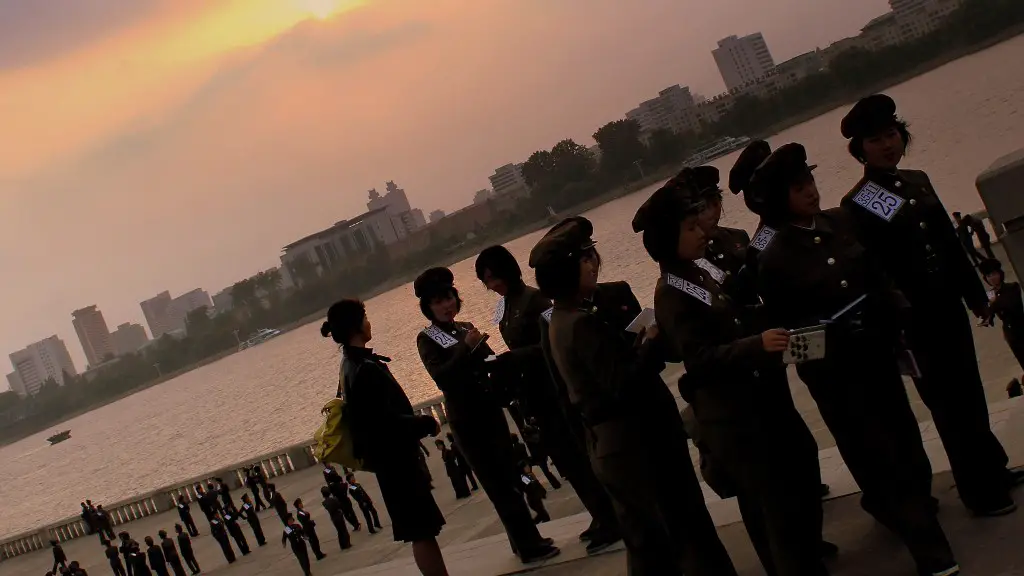Mobilizing for War
The war of words between the United States and North Korea continues to escalate, with the latter continuously testing out intercontinental ballistic missiles and the former issuing sanctions and threats of a “preemptive strike.” But why are we at war with North Korea? The reasons for this conflict are complex and varied.
North Korea is widely considered to be one of the most isolated countries in the world. It has isolated itself from most international relations and rarely allows access to western media or culture. The current regime, headed by Kim Jong-un, has been in power since 2011 and has made clear its intention to use nuclear weapons against the West, using rhetoric that is both hostile and threatening.
In 2017, the North Korean regime became increasingly aggressive in its pursuit of nuclear weapons and nuclear ballistic missiles, launching more than a dozen test missiles into international waters in the Pacific Ocean. This caused much alarm in the international community, as it showed that North Korea was capable of launching missiles long distances and had the capability to reach the United States mainland.
At the same time, the United Nations Security Council imposed severe economic sanctions against North Korea, restricting its access to international trade and the acquisition of weapons or nuclear material. This move, combined with the threat of military action from the United States has been seen as an attempt to exert pressure on North Korea and persuade it to abandon its nuclear ambitions.
The International Community’s Response
The international community has been divided in its response to the crisis. The United States, the European Union and other western countries have spoken out against North Korea’s nuclear weapons program, condemning its aggressive stance and urging it to halt its development.
At the same time, Russia and China have taken a more conciliatory stance towards North Korea. They have called for an easing of sanctions and proposed talks with North Korea to defuse tensions and reach a peaceful solution. Both countries have also provided economic and political aid to North Korea, which in their view is necessary to ensure the survival of the regime and avoid the risk of a much larger regional conflict.
However, the international community has so far failed to reach a consensus on how to respond to the North Korean threat. The United States and other western countries continue to be cautious, while China and Russia advocate dialogue and cooperation.
What Lies Ahead?
It is clear that the North Korean problem is a complicated one, with numerous political and military variables. If an agreement is to be reached between the two sides, it must be through negotiations and voluntary compromises.
The United States has recently reaffirmed its commitment to a diplomatic solution and is pressing China to use its influence on North Korea to bring about a peaceful resolution. However, some experts are skeptical of this effort, arguing that negotiations could take many years and even then may not be successful in curbing North Korea’s nuclear ambitions.
Military Action?
The United States has not ruled out military action against North Korea, and the United Nations Security Council has warned that it may authorize the use of force if North Korea continues its nuclear weapons program.
Although military action carries the risk of causing immense destruction and civilian casualties, some believe that it may provide the best option for achieving peace in the region and containing North Korea’s nuclear ambitions.
Others argue that military action is unwise and would not lead to a lasting solution. They believe that it would only serve to further provoke North Korea and increase tensions in the region.
In addition, the deployment of US troops on the Korean peninsula could trigger a direct military confrontation between the two countries. Any use of force carries the risk of escalation, with the capability to trigger a much larger and catastrophic conflict.
Conclusion
The current situation on the Korean peninsula is complex and unstable. After more than a decade of failed negotiations and aggressive posturing, North Korea has closed off most options for a peaceful resolution to the crisis.
The United States and other western countries remain committed to finding a diplomatic solution, though it appears as though military action is being heavily considered as a last resort.
Ultimately, it is up to the international community to find a way to bring about a lasting peace in the Korean peninsula. It is a long and difficult road ahead, and one that the United States and other countries must tread carefully.

